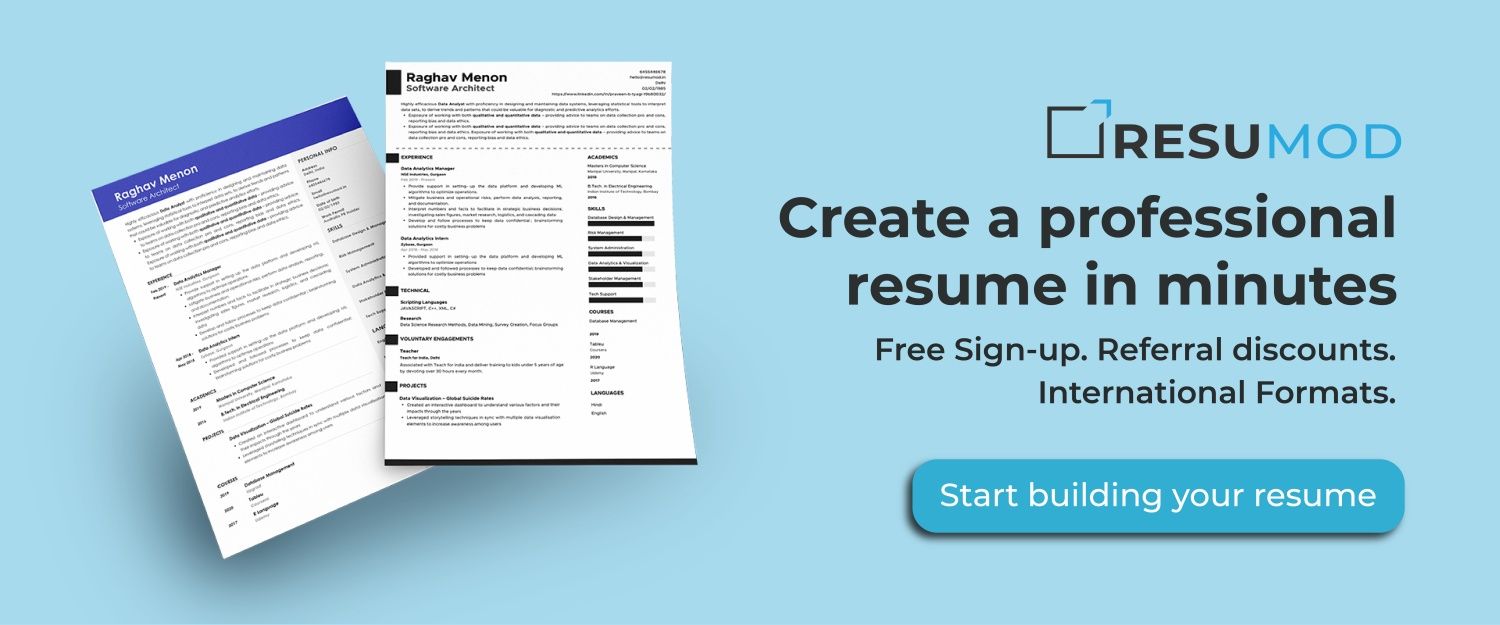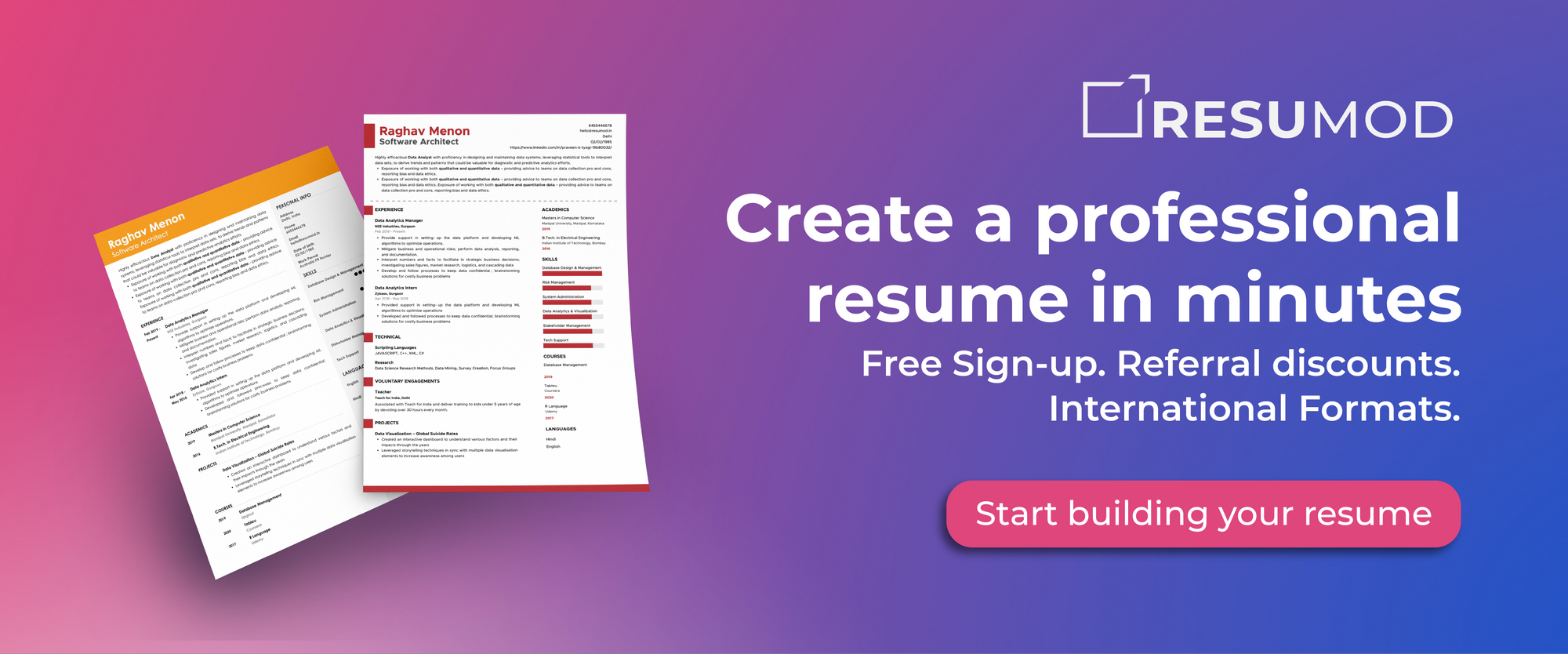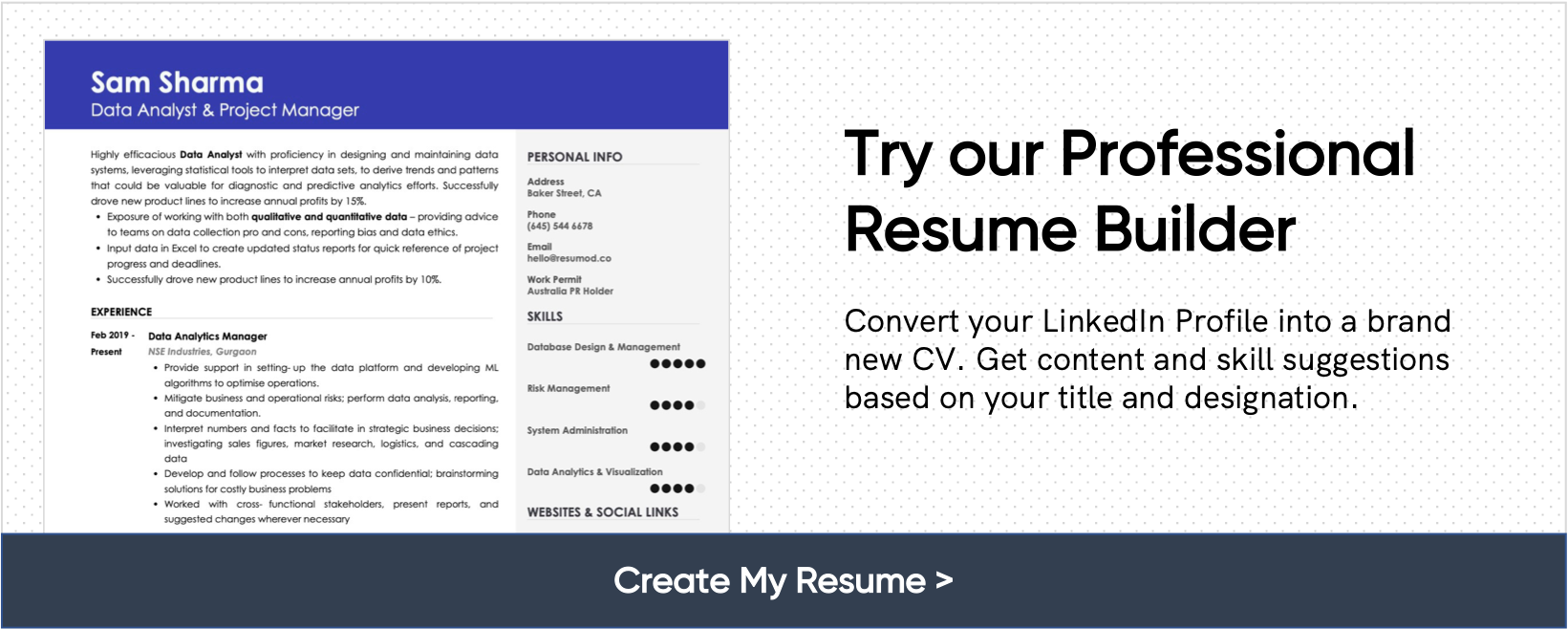How to Become a Blockchain Developer: Top Skills and Strategies for 2024
Blockchain technology is reshaping industries, from finance to supply chain management, and creating new opportunities for developers. If you are curious about how to become a blockchain developer and what it takes to thrive in this cutting-edge field, you’re in the right place.
Blockchain technology is reshaping industries, from finance to supply chain management, and creating new opportunities for developers. If you are curious about how to become a blockchain developer and what it takes to thrive in this cutting-edge field, you’re in the right place.
Let's dive into what blockchain development entails, the skills you need, and how to carve out a successful career in this exciting domain.
In this blog post:
- What is a blockchain?
- What is blockchain development?
- What does a blockchain developer do?
- How to become a blockchain developer?
- How to make a successful career as a blockchain developer?
- What is the salary of a blockchain developer in India?
- The future of blockchain developers in India and the world
What Is a Blockchain?
Before we delve into the specifics of becoming a blockchain developer, let's start with the basics—what exactly is a blockchain?
A blockchain is a decentralized, distributed ledger that records transactions across multiple computers in such a way that the registered transactions cannot be altered retroactively. This technology ensures transparency, security, and trust without the need for a central authority, which is why it's often referred to as a "trustless" system. The most famous application of blockchain technology is Bitcoin, but its uses extend far beyond cryptocurrency.
Imagine a shared Google Doc that everyone in your team has access to. Every time someone makes a change, the document is updated for everyone in real time. Blockchain works similarly but with much stronger security, where every change or "transaction" is permanently recorded and cannot be tampered with.
What Is Blockchain Development?
Blockchain development involves creating and managing the various components that make up a blockchain ecosystem. This includes designing the architecture, developing smart contracts, and maintaining the infrastructure to ensure the network is secure and functional.
Blockchain developers fall into two main categories:
- Core Blockchain Developers: These developers focus on the design, architecture, and security of a blockchain system. They are responsible for creating and maintaining the protocols that define how the blockchain operates.
- Blockchain Software Developers: These developers use existing blockchain platforms to build decentralized applications (DApps). They interact with the underlying blockchain and create applications that leverage its capabilities.
What Does a Blockchain Developer Do?
As a blockchain developer, your day-to-day responsibilities can vary widely depending on your role. Here's a glimpse into what you might be doing:
- Designing Blockchain Protocols: Core developers design protocols that dictate how the blockchain operates, including how data is stored, retrieved, and verified.
- Developing Smart Contracts: Smart contracts are self-executing contracts with the terms of the agreement directly written into code. Blockchain developers create these contracts to automate transactions and enforce rules without the need for intermediaries.
- Building Decentralized Applications (DApps): Software developers build DApps that operate on blockchain technology. These applications are decentralized, meaning they don't rely on a single server or authority.
- Maintaining Blockchain Infrastructure: Developers are responsible for ensuring that the blockchain network is secure, scalable, and efficient.
- Implementing Security Measures: Blockchain security is paramount. Developers must continuously update and improve the network’s security to protect against potential attacks.
How to Become a Blockchain Developer?
Becoming a blockchain developer is an exciting and challenging journey that requires a blend of theoretical knowledge and practical skills. If you’re considering a career in this field, here’s an in-depth look at the steps you should follow to achieve your goal.
Learn the Fundamentals of Blockchain Technology
Your first step should be to grasp the basics of blockchain technology. This includes understanding how a blockchain works, the role of consensus mechanisms, and the significance of decentralization. Blockchain is essentially a distributed ledger that records transactions across multiple computers in a way that ensures security and transparency.
There are numerous resources available to help you learn these fundamentals. Books like "Mastering Bitcoin" by Andreas Antonopoulos and online courses such as those offered by Coursera and Udemy will introduce you to key concepts like blocks, chains, nodes, and peer-to-peer networks, providing a solid foundation for more advanced learning.
Master Cryptography
Cryptography is crucial to blockchain technology, as it secures data and ensures that transactions are verified and irreversible. As a blockchain developer, you’ll need to understand the basics of cryptographic techniques, including hashing algorithms, public and private key cryptography, and digital signatures.
For instance, hashing functions like SHA-256 are used to secure the data within each block. Public and private keys are essential for creating and managing digital wallets, and digital signatures authenticate the identity of participants in a transaction. Gaining a deep understanding of these concepts will be vital to your success in blockchain development.

Understand Data Structures and Algorithms
A deep understanding of data structures and algorithms is essential for developing efficient blockchain systems. Blockchain relies on complex data structures like Merkle trees, linked lists, and hash maps to store and manage data securely and efficiently.
Merkle trees, for instance, are used to ensure data integrity by organizing and summarizing large amounts of data in a way that allows for quick and secure verification. Understanding how to implement and manipulate these data structures, along with algorithms that optimize their performance, is a key part of blockchain development.
Learn Programming Languages
Proficiency in programming languages is a must for blockchain development. Depending on the platform or type of blockchain you want to work on, different languages may be required:
- Solidity: This is the most widely used language for developing smart contracts on the Ethereum platform. Solidity is designed specifically for blockchain development and is essential for anyone looking to create decentralized applications (DApps) on Ethereum.
- C++: Known for its high performance and control over system resources, C++ is often used to build the core components of blockchain systems, including nodes and consensus algorithms.
- Python: With its simplicity and readability, Python is commonly used in blockchain development, particularly for scripting and automating tasks.
- JavaScript: Popular for building web applications, JavaScript is also used in blockchain development, especially when working with frameworks like Node.js to create DApps.
Get Familiar with Blockchain Platforms
To become a successful blockchain developer, it’s important to understand and work with various blockchain platforms. Each platform has its own features, use cases, and development environments. Some of the most popular platforms include:
- Ethereum: Known for its robust smart contract capabilities, Ethereum is the go-to platform for creating decentralized applications.
- Hyperledger: This enterprise-focused platform is used for building private, permissioned blockchains tailored for business use cases.
- Binance Smart Chain: A platform that supports smart contracts and offers compatibility with Ethereum’s tooling, making it popular for DeFi projects.
- Polkadot: Known for its interoperability features, Polkadot allows different blockchains to communicate and share data seamlessly.
By gaining hands-on experience with these platforms, you’ll be able to understand their unique features and develop applications that leverage their strengths.
Build Your Own Blockchain and DApps
There’s no better way to learn than by doing. Building your own blockchain or developing decentralized applications (DApps) is an excellent way to apply what you’ve learned and showcase your skills to potential employers.
Start with small projects, such as creating a simple cryptocurrency or a basic smart contract. As you gain more confidence, you can tackle more complex projects, such as building a full-fledged DApp or even creating your own blockchain from scratch. This hands-on experience will not only deepen your understanding but also provide you with a portfolio of work that demonstrates your abilities.
Join the Blockchain Community
Blockchain development is a rapidly evolving field, and staying connected with the community is essential for keeping up with the latest trends and technologies. Networking with other blockchain enthusiasts can provide valuable insights, resources, and opportunities.
Consider joining online forums like Reddit’s r/blockchain or Stack Overflow, where you can ask questions, share your knowledge, and learn from others. Attending blockchain conferences, participating in hackathons, and joining local meetups are also great ways to connect with like-minded individuals and stay informed about industry developments.
Stay Updated with Industry Trends
The blockchain industry is constantly changing, with new technologies, platforms, and use cases emerging regularly. To succeed as a blockchain developer, you’ll need to stay updated with the latest trends and developments.
Follow industry leaders on social media, subscribe to blockchain-related newsletters, and regularly read industry publications like CoinDesk or Blockchain News. Staying informed about the latest advancements will not only help you stay competitive but also enable you to anticipate and adapt to changes in the industry.
How to Make a Successful Career as a Blockchain Developer?
Becoming a successful blockchain developer goes beyond just acquiring technical skills. Here are some tips to help you build a rewarding career:
- Focus on Continuous Learning: The blockchain industry is still in its infancy, and new technologies are emerging rapidly. Stay curious and keep learning to stay ahead of the curve.
- Build a Strong Portfolio: Showcase your projects, including any blockchains, smart contracts, or DApps you’ve developed. A strong portfolio can set you apart from other candidates in the job market.
- Seek Out Mentorship: Learning from experienced developers can accelerate your growth. Seek out mentors who can provide guidance, feedback, and support as you navigate your career.
- Develop Soft Skills: Technical skills are essential, but don't overlook the importance of soft skills. Effective communication, problem-solving, and teamwork are crucial in collaborative environments.
- Explore Different Industries: Blockchain technology is being adopted across various sectors, including finance, healthcare, supply chain, and entertainment. Explore opportunities in different industries to find the niche that interests you the most.
What is the Salary of a Blockchain Developer in India?
The demand for blockchain developers is skyrocketing, and with it comes competitive salaries. In India, the average salary for a blockchain developer ranges from INR 6 to 10 lakhs per annum for entry-level positions. For mid-level professionals, the salary can go up to INR 15 to 30 lakhs per annum, while senior developers can earn upwards of INR 45 lakhs annually.
These figures reflect the growing recognition of blockchain's potential and the value of skilled developers in the market. As more industries adopt blockchain, these numbers are expected to rise even further.
The Future of Blockchain Developers
The future of blockchain development looks promising. Here's why:
- Increasing Adoption Across Industries: Blockchain is no longer limited to cryptocurrencies. Industries such as healthcare, supply chain, real estate, and even government services are exploring blockchain for its transparency, security, and efficiency. This trend is expected to drive demand for blockchain developers across various sectors.
- Government Support and Regulation: In India, the government is gradually recognizing the potential of blockchain technology. While there are still challenges in terms of regulation, initiatives like the National Blockchain Framework are paving the way for wider adoption.
- Global Opportunities: Blockchain development is a global phenomenon. With the rise of remote work, Indian developers can work with international companies, tapping into higher salary packages and diverse projects.
- Emerging Technologies and Interoperability: The future of blockchain will likely involve interoperability between different blockchains, integration with AI, IoT, and other emerging technologies. Developers who can navigate these complex ecosystems will be in high demand.
- Educational Initiatives: As awareness of blockchain's potential grows, more educational institutions and online platforms are offering courses and certifications in blockchain development. This will create a larger talent pool and accelerate the technology's adoption.
Top Rated Blockchain Developer Resumes on Resumod
Resume of Blockchain Developer
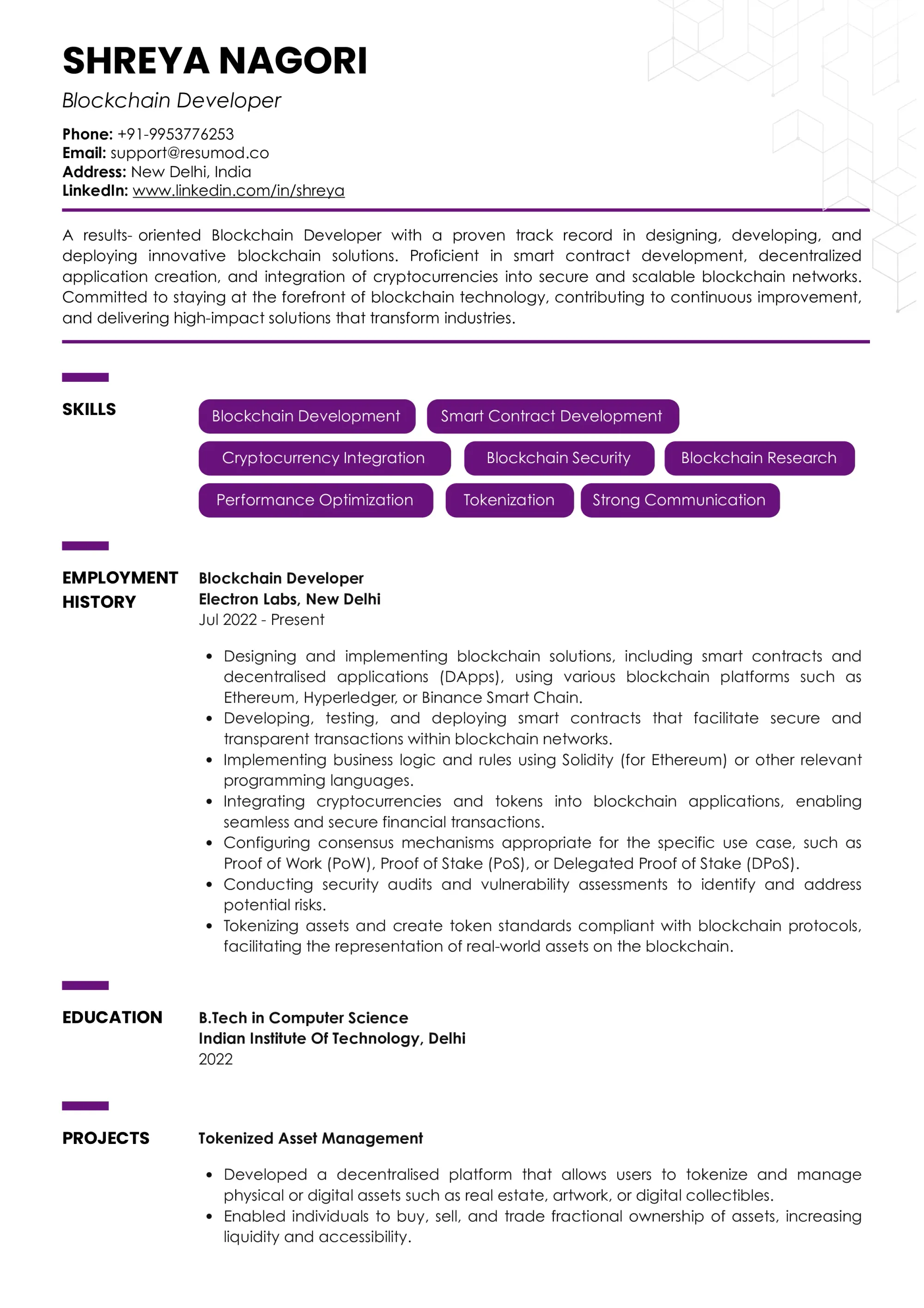
Check the full resume of blockchain developer in text format here.
Resume of Blockchain Engineer
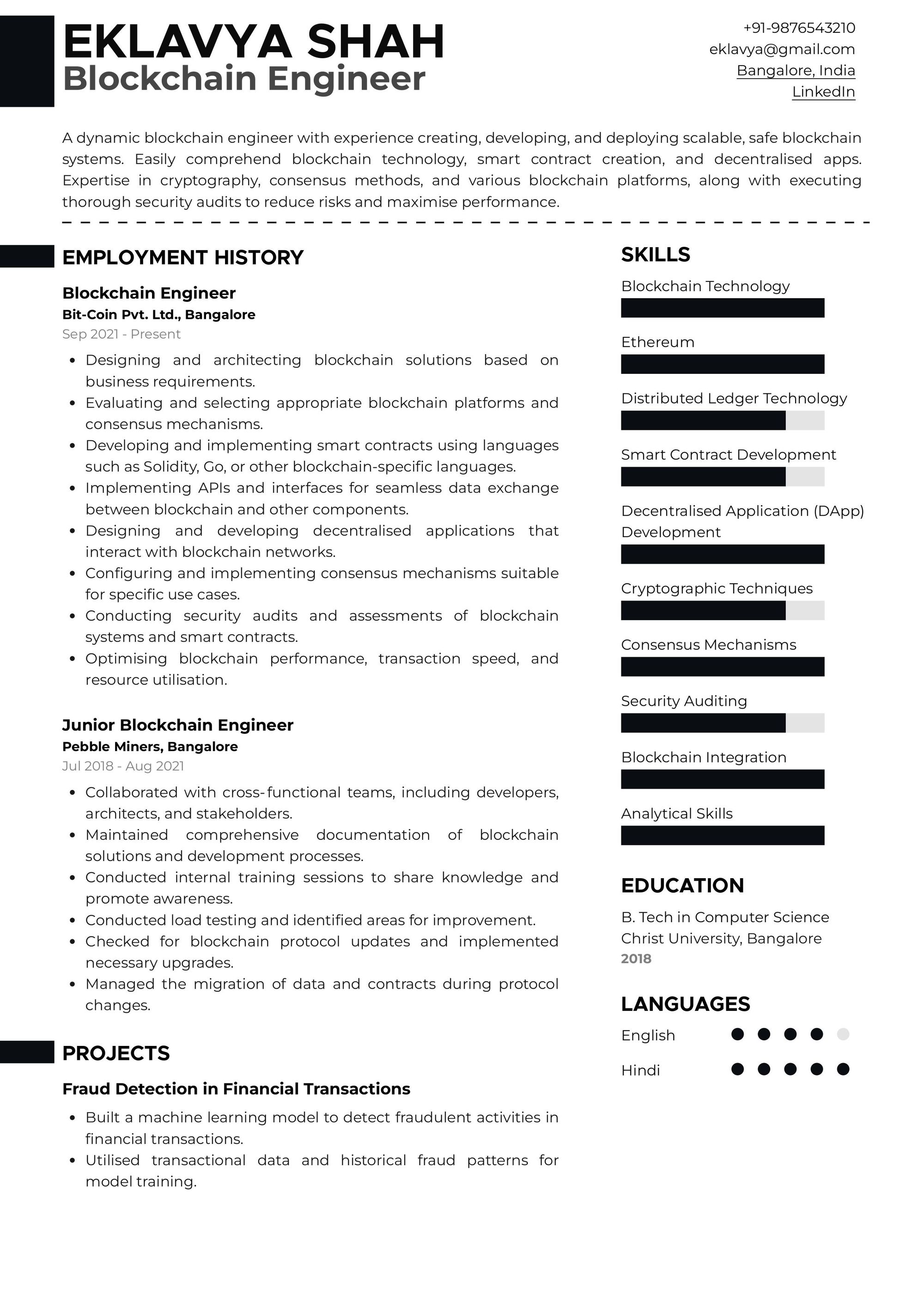
Check the full resume of blockchain engineer in text format here.
Final Words
Becoming a blockchain developer requires a combination of technical expertise, continuous learning, and a passion for innovation. With the right skills and mindset, you can carve out a successful career in this rapidly evolving field. The demand for blockchain developers is high, and the potential for growth is enormous, both in India and globally.
As blockchain technology continues to disrupt traditional systems, developers who can harness its power will be at the forefront of this revolution. So, start learning, stay curious, and embrace the future of technology with blockchain development!

